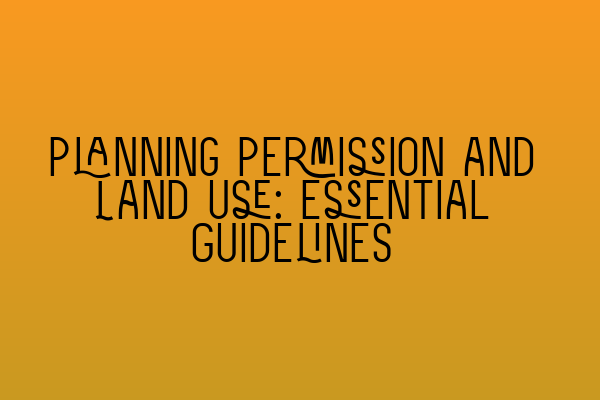Planning Permission and Land Use: Essential Guidelines
Welcome to our blog post on planning permission and land use. As property solicitors at SQE Property Law & Land Law, we understand the importance of navigating the complexities of planning permission and ensuring compliance with land use regulations. Whether you are a homeowner looking to extend your property or a property developer embarking on a new project, understanding the essential guidelines for planning permission and land use is crucial.
Here, we will provide you with a comprehensive overview of planning permission and land use, including the key considerations, the application process, and the potential consequences of non-compliance. So, let’s dive in!
**1. Understanding Planning Permission**
Planning permission is the official consent required from the local planning authority for certain types of development or change of land use. It ensures that any proposed changes or developments are in line with the local development plan and adhere to policies set out by the government.
**2. Key Considerations**
Before applying for planning permission, there are several key considerations to keep in mind:
– Local Development Plan: Familiarize yourself with the local development plan, which outlines the policies and regulations specific to your area. This will give you an insight into what is likely to be permitted and what may be restricted.
– Zoning and Land Use Designations: Are you proposing a change of land use? If so, ensure that your proposed use is permitted in the zoning and land use designations for that area. It is essential to research the specific land use designations applicable to your site.
– Consultation and Stakeholder Engagement: Engage with the local community and consult relevant stakeholders early on in the planning process. This will help you understand their concerns and address them proactively.
**3. The Planning Permission Process**
The planning permission process typically involves the following steps:
– Pre-Application Advice: Seek pre-application advice from the local planning authority. This can help you understand the potential issues and challenges associated with your proposed development, allowing you to make any necessary modifications before submitting your application.
– Application Submission: Prepare a comprehensive planning application, including all necessary documentation, such as plans, reports, and any other supporting information required. Be sure to complete the forms accurately and pay the necessary fees.
– Decision-Making: Once your application is submitted, the local planning authority will review it and assess whether it complies with the relevant policies and regulations. They may consult with other bodies, such as highways agencies or environmental authorities, depending on the nature of your proposal.
– Determination: The local planning authority will determine whether to grant or refuse planning permission. If granted, planning conditions may be imposed, which you must comply with during the development process.
– Appeals: If your application is refused or conditions are imposed that you disagree with, you may have the right to appeal the decision to the Planning Inspectorate.
**4. Consequences of Non-Compliance**
Failure to obtain planning permission or non-compliance with the conditions imposed can have serious consequences. These may include:
– Enforcement Action: The local planning authority has the power to take enforcement action if you commence development without permission or fail to comply with planning conditions. This may result in fines, injunctions, or even demolition of the unauthorized development.
– Compulsory Purchase Orders: In certain circumstances, the local planning authority can use compulsory purchase powers to acquire land or properties where development has been carried out without permission.
To ensure compliance with planning permission and avoid these consequences, it is crucial to consult with a qualified and experienced property solicitor who can guide you through the process and ensure all necessary steps are taken.
In conclusion, understanding planning permission and land use guidelines is essential for homeowners, property developers, and anyone looking to undertake development projects. By familiarizing yourself with the key considerations, understanding the application process, and seeking professional advice when needed, you can navigate this complex field effectively and fulfill your property goals.
Contact SQE Property Law & Land Law today to speak with our experts for guidance and assistance with your planning permission and land use matters.
Related Articles:
– SQE 1 Practice Exam Questions
– SQE 1 Practice Mocks FLK1 FLK2
– SQE 2 Preparation Courses
– SQE 1 Preparation Courses
– SRA SQE Exam Dates
Disclaimer: This article provides general information and does not constitute legal advice. Always consult a qualified solicitor for guidance tailored to your specific circumstances.
